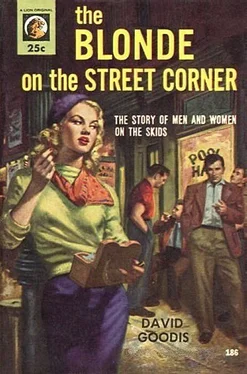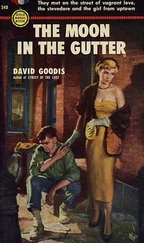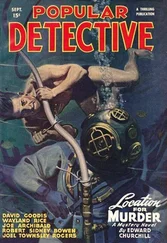Soft music glided into the room and drifted from wall to wall.
Addie moaned and murmured, “Oh — it’s so — it’s so sweet, Ralph. Isn’t it a sweet song? Give me part of the paper.”
“I’m reading it now.”
“Well, you can’t have the whole paper—”
Ralph was separating the sports pages from the rest of the second section of the paper. Addie was grabbing and saying, “No, I want this part.”
“What part?”
“This part. You can’t have it all.”
“Damn it, can’t you leave me alone? I’m sitting here reading the paper!”
“Well, I want this part,” Addie hollered.
“All right, take it, take it.” Ralph had to give up the final sport page, which was attached to a feature page carrying four half-page columns entitled Ethical Problems .
Adeline read this feature every night. She read every line of print and sometimes she would cut out something that she wished to keep. This Ethical Problems consisted of letters sent in by young people. The great majority of these letters was sent in by high school girls and concerned problems of a romantic nature, ending with lines such as—
“Do readers think I should see this boy any more?
DISGUSTED.”
Adeline frowned as she read. Her eyes stared unblinkingly at the Ethical Problems. This was all very serious and had to be studied carefully so a person could use good common sense and come to the right conclusions.
“Sir:
We are two girls living on the same block. Recently a new boy moved into this same block. He is very nice. But he never looks at us. We are both attractive and we cannot understand why he ignores us. What should we do?
PUZZLED.”
“Sir:
We are two fellows who can roller-skate as good as any of the so-called ‘flashes’ from Richmond. We are very good-looking. When we arrive at the rink the girls cluster around us and make a big fuss over us. This is very annoying. Why don’t they leave us alone? These girls interfere with our roller-skating. If they don’t know how to behave themselves they should be asked to leave the place.
TWO DONS.”
Adeline punched at the paper and said, “The very idea! I’d like to tell those smart alecks a thing or two. I’m going right upstairs this minute and write a letter to the Bulletin . Who do they think they are, anyway?”
She was breathing hard as she ran up the steps, down the hall and into the bedroom that she shared with her sister. She pulled open the bottom drawer of the bureau, and began to push aside stockings and handkerchiefs and blouses until she found a box of pale green paper and envelopes. The first few pieces of paper were dirty and wrinkled. Adeline’s indignation grew and she muttered something about the stationery department in that store on Broad Street.
She began to write furiously—
“Sir:
Who do those TWO DONS think they are, anyway? I go roller-skating with my girl friends and we never pay any attention to the boys, even though they always try to attract our attention by showing off and everything. We can skate just as good as the boys and in fact better. And besides, I would like to take a look at those TWO DONS to see if they are really as good looking as they say they are.
ADELINE.”
She read the letter over and nodded emphatically. “I guess that’ll tell them,” she murmured. Then she addressed the envelope. Before writing her name and address on the rear flap she hesitated. Maybe it wasn’t a good idea to let them know her name and address. And on the other hand—
Mrs Creel was yelling, “Dinner’s ready!”
In the small breakfast room they all settled down at the small table. They were reaching for food. They were hungry, all of them. They did not talk. They sat there and worked on the food and shoveled it into their mouths. Each was scarcely aware of the others’ presence, scarcely aware of the blaring music clattering from the radio in the living room.
All the others were fast eaters, but Creel took his time. His work at the ice plant was enough of a hurry-up process in itself. It slowed all his other activities. It made him eat more slowly, talk more slowly, walk more slowly, think more slowly.
“Norman, take some more,” his wife said.
“I got enough here. I’m not finished with this yet.”
“Now take some more, Norman. Here—” She put it on his plate.
“Pop, give me the water,” Evvie said.
He reached over to hand her the water pitcher.
“Mom, I got an 80 in a history test today,” Adeline said.
“That’s very nice,” the mother said.
And then they were quiet again, eating furiously.
Mrs Creel got up and started to take dishes away. Adeline did the same. They came out of the kitchen carrying plates of vanilla pudding. They all liked vanilla pudding. Three times a week they had it for dessert.
They all leaned low over the table and gobbled up the pudding. Mr Creel took his time with the gobbling. Then they were all drinking water and getting up from the table. The girls stayed to help their mother with the dishes.
Ralph and his father walked into the living room. Ralph lit a cigarette. He said, “Wanna smoke, Pop?”
“No, thanks, son, I got a cigar.”
“Cigar? What’s the big occasion?”
“One of the boys down at the plant got a good break. Uncle died and left him a lot of money. He’s quitting his job. Today he gave all of us cigars.” Mr Creel lit up and took a deep, luxurious puff. Exhaling, watching the blue smoke drift up, he murmured, “It’s been a long time since I smoked one of these.”
Ralph said, “Look, Pop, if that guy’s leaving, maybe you can work me in.”
The father shook his head. “Couldn’t be done,” he said. “This fellow’s a skilled refrigeration worker. It took him ten years to learn his job.”
Mr Creel picked up the paper, started to turn the pages. Ralph sat there, staring at the floor. Whenever he started to talk to his father about jobs, about getting work, about anything connected with work and wages and so forth, the old man would slice the subject, grab the newspaper and end it then and there. He never tried to help Ralph land a job. He never told him about work. Sometimes Ralph thought it was because the old man was disgusted with him. But it didn’t seem that way. It just seemed as if his father wasn’t interested in the subject. But even then it was funny that he should not want to talk about it. And in a way it was a sort of relief. It was bad enough his mother was always on his ear about getting a job. He was lucky his father just didn’t seem to care one way or the other. Sometimes he felt guilty about the matter. He knew that Evvie was giving in ten bucks a week out of her eighteen. He ought to be doing something. But there wasn’t anything around. Conditions were bad, that was all there was to it. Could he help it if conditions were bad?
His feet were sprawled out in front, he was sunk deep in the sofa, his hands in the side pockets of his trousers. He glowered at the rug. He turned and looked at his father. His father was reading the paper. He heard the chatter and clatter of his mother and two sisters and the water and the dishes from the kitchen.
Well, he had to find something. Things just couldn’t go on this way. He wasn’t doing anything now. Not a thing. How could a guy just go on and on — not doing a thing? At least a guy should do something, no matter how small it was. Like his mother kept telling him — anything at all, any kind of a job, so long as it was a job. He could see that now. He could see that in a way he was sort of forced to go out and get something — anything, and for the moment he was promising himself that tomorrow he would be up early and he would go in town.
Читать дальше












